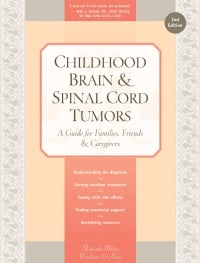Childhood Brain and Spinal Cord Tumors
The neurosurgeon
Pediatric neurosurgery developed as a subspecialty in the 1980s. Generally, neurosurgeons who operate 50 percent of the time or more on children are considered pediatric neurosurgeons. Today most pediatric neurosurgeons complete 1 year of fellowship with an established pediatric neurosurgeon in a program approved by the American Board of Pediatric Neurological Surgery. There are approximately 225 board-certified pediatric neurosurgeons in the United States (see www.abpns.org for their names and locations). Surgeons who devote the majority of their practice to children usually provide the most aggressive surgical approach to try to cure the child.
A few hours earlier, we had come to the children’s hospital to determine what was bothering Mia. I thought it would be a sprained muscle, a pinched nerve, maybe a herniated disk; never in a million years did I imagine she had a tumor and we’d be discussing brain surgery. A team of doctors came by and one doctor said it was a tumor and it was pretty big. He said that she needed surgery right away because the tumor was causing fluid in her brain to accumulate. My head was spinning. I needed to understand. Ask questions. What was the neurosurgeon’s background? How long did it take? How many times had he done this? Did the children always live? Could he promise me she would live?
She was in surgery for hours, and my mom, my aunt, and I sat in the waiting room. Then I saw the green jumpsuit, a little green hat, white beard, and small eyes. We jumped up and the neurosurgeon said, “She’s fine. We’re done and she is sleeping. Come with me.” We walked into a small room and before he could close the door, I asked him, “Is it malignant? He said he had good news and bad news. He told us the tumor was malignant and was called medulloblastoma. The good news was that he believed he had removed all of it.
If your child does not require emergency surgery, you have time to locate a board-certified pediatric neurosurgeon with significant experience operating on children with brain or spinal cord tumors. Results of the most recent research studies indicate that the amount of tumor removed by the surgeon directly affects a child’s chances of survival and cure. Research has also confirmed that children operated on by pediatric neurosurgeons have more tumor removed than those operated on by adult neurosurgeons. Therefore, it is best to have your child’s surgery performed by a pediatric neurosurgeon with extensive experience operating on children with cancer. A senior pediatric neurosurgeon suggests:
The most important advice I would offer to a family is logical but not necessarily widely accepted. Quite simply, be certain that your child is cared for by a surgeon who is experienced in caring for children. Children are not simply “little adults.” There is no rationale in assuming that the surgeon who cares largely for adults is equally qualified to look after a newborn baby or young child. This has nothing to do with intelligence, but is simply a logical extension of the meaning of experience in any facet of life. A carpenter who builds bookshelves will probably do it better than a carpenter that has spent his life building houses. A pilot of a space shuttle is not trained to be an airline pilot.
Surgical treatment is only one aspect of overall care. Therefore, when a major surgical procedure is planned, it is essential that it be carried out in a children’s hospital that uses a team approach. With a team approach, pediatricians, pediatric anesthesiologists, pediatric radiologists, pediatric nurses, child life specialists, and social workers are all part of an integrated group that is devoted to a single goal: the recovery of your child.
Table of Contents
All Guides- Introduction
- 1. Diagnosis
- 2. The Brain and Spinal Cord
- 3. Types of Tumors
- 4. Telling Your Child and Others
- 5. Choosing a Treatment
- 6. Coping with Procedures
- 7. Forming a Partnership with the Treatment Team
- 8. Hospitalization
- 9. Venous Catheters
- 10. Surgery
- 11. Chemotherapy
- 12. Common Side Effects of Chemotherapy
- 13. Radiation Therapy
- 14. Peripheral Blood Stem Cell Transplantation
- 15. Siblings
- 16. Family and Friends
- 17. Communication and Behavior
- 18. School
- 19. Sources of Support
- 20. Nutrition
- 21. Medical and Financial Record-keeping
- 22. End of Treatment and Beyond
- 23. Recurrence
- 24. Death and Bereavement
- 25. Looking Forward
- Appendix A. Blood Tests and What They Mean
- Appendix C. Books and Websites

